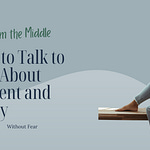This week on the podcast, I dove into something that’s been resonating with so many people lately: Mel Robbins’ The Let Them Theory. I already shared my review of the book over on Substack, but I wanted to take it a step further—because when it comes to parenting, letting them isn’t always so simple.
Mel makes a great point in her book: we can’t control other people. And as parents, if there’s one humbling realization we all face, it’s that we really can’t control our kids. They are their own people, and our role isn’t to micromanage their every move but to guide them. However, that doesn’t mean we just let them do whatever they want. We have to be their sturdy leader, stepping in when necessary and allowing them to experience life’s natural consequences when appropriate.
So, how do we apply The Let Them Theory to parenting? I’ve broken it down into two parts—what we let them do, and what we let ourselves do in response.
Let Them…
🔹 Be upset with you for holding a boundary. It’s okay if they’re mad about losing screen time or not getting an iPhone just yet. Their frustration doesn’t mean you’re doing something wrong—it means you’re parenting with intention.
🔹 Feel frustration and discomfort. If we swoop in to fix every moment of frustration, they never learn to manage their emotions. Sometimes, the best thing we can do is let them sit with it.
🔹 Forget something and deal with the consequences. Forgot a homework assignment or soccer cleats? Natural consequences are the best teachers. Some parents even give their kids one get out of jail free pass per quarter, but after that, they’re on their own.
🔹 Struggle before stepping in to help. Resist the urge to fix their science project or solve their math problem the moment they get stuck. Learning happens in the struggle.
🔹 Be bored. Boredom fosters creativity. Not every moment needs to be scheduled or entertained—sometimes, staring out the window is the best thing for their brain.
🔹 Experience emotions like anxiety, stress, and sadness. Not every anxious feeling requires an immediate solution. Avoiding discomfort doesn’t build resilience—learning how to navigate it does.
Let Me…
🔹 Model healthy habits, communication, and self-care. Kids learn regulation by watching us. How we handle stress, maintain friendships, and prioritize self-care teaches them how to do the same.
🔹 Hold boundaries with confidence. Permissive parenting can actually create anxiety for kids because it leaves them feeling like no one is in charge. Boundaries provide safety and security.
🔹 Guide, not rescue. Instead of always fixing problems for them, I can ask, How would you like to handle this? or What ideas do you have? This builds confidence and problem-solving skills.
🔹 Push them to build resilience. It’s okay if they’re hesitant about trying something new—that doesn’t mean we avoid it altogether. We can find the balance between gentle push and thrown to the wolves.
🔹 Teach life skills that build independence. Too many kids enter middle school without knowing how to tie their shoes, open a lunch bag, or clean up after themselves. These small tasks build the foundation for real-world success.
🔹 Be the sturdy leader. I am not my child’s friend—I am their safe, steady guide. They will be upset with me at times, and that’s okay because I am parenting from a place of love and wisdom.
Where Can You Lean Into Let Them and Let Me?
As parents, we can’t control our kids, but we can control how we show up. We can hold firm to our boundaries, provide a safe and loving environment, and step into our role as their sturdy leader.
So this week, I challenge you—where can you lean into let them? And where can you step in to let me?
I’d love to hear your thoughts! Comment below, send me a message, or share this with a fellow parent who might need the reminder. And as always, I’m so grateful to be part of your parenting journey.
Talk soon, Ashley









